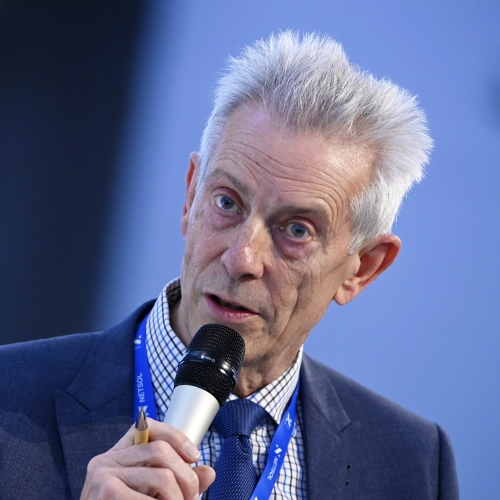Effects of economic and geopolitical uncertainty on the auto industry
As the automotive industry faces a myriad of challenges, from adjusting to the changing dynamics of the economy in the aftermath of Covid-19 and rising inflation and interest rates from the current cost-of-living crisis, to equipping itself for the mobility revolution including connected and autonomous motoring, electrification and zero emissions, Professor Jim Saker, President of the Institute of the Motor Industry (IMI) discusses the economic and geopolitical uncertainty currently facing the sector.
At the Asset Finance Connect Winter Conference 2022, Professor Jim Saker addressed rising concern around the lack of access to raw materials that are vital for the manufacture of batteries. These resources are largely controlled by China. It is the restrictions on access to these resources and our current lack of ready infrastructure for electric vehicles that Saker believes makes the planned ban on manufacture of ICE vehicles by 2030 unwise.
Growing demand for EVs and shortage of raw materials
With the deadline to carbon net zero looming, the number of electric vehicles (EVs) is increasing and manufacturers are racing to secure and strengthen their position in the battery supply chain, from mineral extraction and processing to battery and EV manufacturing.
The International Energy Agency (IEA) has projected skyrocketing global demand for electric-vehicle-sized lithium-ion batteries increasing by over 40 times by 2030.
However, to meet this ever-increasing demand, auto manufacturers are going to have to overcome a big obstacle: where to get enough of the raw materials, which have to be mined and refined, to power the batteries in all those electric vehicles?
Batteries are one of the most important and expensive components of EVs, and over the past decade, China has deftly maneuvered to dominate the electric vehicle supply chain, particularly when it comes to the raw materials – cobalt and lithium.
Chinese companies are poised to meet the surge in demand. In 2021, more than 3 million electric cars were sold in China — making it the largest market for the vehicles — and the country’s battery industry is growing exponentially to keep pace. China’s share of global lithium-ion battery production capacity was 76% in 2020, while the US share was a mere 8%, with China clearly in pole position.
“With the deadline to carbon net zero looming, the number of EVs is increasing and manufacturers are racing to secure and strengthen their position in the battery supply chain.”
China’s dominance in the battery supply chain
China is the world’s biggest market for EVs and, in its quest to be the global leader in electric vehicle manufacturing, China has overtaken other countries as the world’s battery production capital, with Chinese battery manufacturers such as CATL enjoying a meteoric rise in recent years.
Research into the “new energy” vehicle industry (electric and hydrogen fuel cell vehicles) has been funded by the Chinese government with more than $100bn, according to the Center for Strategic and International Studies. But the Chinese government didn’t stop at funding for the cars themselves; as early as 2012, they provided $214m in electric vehicle research funding primarily for battery technologies.
Battery raw materials
The EV revolution is ushering in a golden age for battery raw materials, reflected by a dramatic increase in price and demand for two key battery commodities, lithium and cobalt, over the past 24 months. China currently has the advantage, both in terms of sourcing lithium and cobalt, and the processing of the ‘blue’ metal. The global demand for cobalt is expected to surge to over 200,000 mt per year by 2025, according to Eurasian Resources Group (ERG), a leading producer for battery-use cobalt that is headquartered in Luxembourg.
According to a 2019 working paper – Interconnected supply chains: a comprehensive look at due diligence challenges and opportunities sourcing cobalt and copper from the Democratic Republic of the Congo – by the Organisation for Economic Co-operation and Development (OECD), eight of the 14 largest cobalt mines in the Democratic Republic of the Congo (DRC) are Chinese-owned and account for almost half of the country’s output. And, most importantly, China represents 80% of the world’s production of cobalt chemicals and the vast majority of refining capacity.
According to the OECD paper, “the dominant market position in the refining stage acquired by Chinese companies shows a good capacity to harness the expected rise in battery demand and the increased competitiveness of battery and component manufacturers in China and Korea, in the context of a growing importance of Chinese energy security and the opportunity to leapfrog internal combustion engine vehicles.”
However, more importantly for global car manufacturers, Chinese companies have a controlling share of the market for the processed cobalt that is the critical battery ingredient that powers the majority of electric vehicle fleets
“China has built a wide-ranging lithium battery strategy over the past decade and executed that strategy to powerful effect.”
Chinese companies — often backed by the government — have secured lithium buying stakes in mining operations in Australia and South America where most of the world’s lithium reserves are found.
China’s Tianqi Lithium owns 51% of the world’s largest lithium reserve, Australia’s Greenbushes lithium mine, and, in 2018, they paid approximately $4bn to become the second-largest shareholder in Sociedad Química y Minera (SQM), the largest lithium producer in Chile.
Another Chinese company, Ganfeng Lithium, now has a long-term agreement to underwrite all lithium raw materials produced by Australia’s Mount Marion mine, the world’s second-biggest, high-grade lithium reserve.
In short, China has built a wide-ranging lithium battery strategy over the past decade and executed that strategy to powerful effect.
Chinese dominance in the supply chain is even clearer at the refining stage: BloombergNEF’s (BNEF) global lithium-ion battery supply chain ranking, released in November 2022, shows that China continues to dominate for the third ranking in a row, for both 2022 and its projection for 2027, thanks to continued support for the electric vehicle demand and raw materials investments.
China’s dominance in the rankings shows that refining capacity is just as important, if not more, as access to raw materials and mining capacity.
OEMs moving to China…or not?
So, has China’s leading position in the EV market as well as their dominance in the battery supply chain led to UK and European car manufacturers moving production to China?
The growth in China’s automotive industry was fuelled by European and US carmakers that farmed out the production of an increasing number of their components to China to save costs and establish links with the world’s largest car market.
For example, in 2019, BMW Group announced that it would build future MINI E vehicles in China with Great Wall Motor by building a joint plant in China under the new joint venture, Spotlight Automotive Limited. Recently The Times reported that BMW is set to move production of its electric minis from the UK to China by the end of 2023. However, BMW has denied the report.
Tesla’s factory in Shanghai now produces more cars than its plant in California, with some of the batteries that drive them being Chinese-made with the minerals that power the batteries being largely refined and mined by Chinese companies.
However, China’s dominance over the world automotive market may be about to change. A recent Financial Times article noted that carmakers are beginning to cut ties with China, launching a “quiet yet concerted effort to cut their reliance on China’s sprawling network of components makers.”
The article highlights two key developments that have prompted this move by international car manufacturing groups – (i) China’s zero Covid-19 policy which is causing uncertainty in the industry due to the extended closure of manufacturing plants at short notice; and (ii) a threat to trade caused by a “political decoupling” should there be a breakdown in the relationship between China and the international community.
While foreign car manufacturers will not totally abandon China’s supply chain, they will slowly ease the flow of components from China to other international plants over time. However, the article suggests that foreign manufacturers will retain their connections with the Chinese supply chain purely for the manufacturer of cars that are exclusively for the Chinese market.
Car manufacturers will increasingly be looking elsewhere for car parts and components, while ensuring a robustness and resilience in the supply chain and costs. This particularly applies to sourcing EV batteries, where it will become necessary to strengthen and diversify the battery supply chain away from China, especially where raw materials are concerned.
“Car manufacturers will increasingly be looking elsewhere for car parts and components, while ensuring a robustness and resilience in the supply chain and costs.”
Rising raw material costs
In its Europe Autos 2023 Outlook report, Bloomberg Intelligence believes that rising battery costs and battery demand could be the industry’s next major complication, with escalating battery prices impacting the retail cost of an EV.
The IEA forecasts that the automotive sector will require 50 new lithium projects, 60 nickel mines and 17 cobalt developments by 2030 to meet soaring global EV demand.
In an effort to secure the supply of vital EV battery raw materials, away from China’s control, car manufacturers are beginning to invest upstream in the mining sector, with many OEMs making direct equity investments in mining companies or mining projects, or providing funding to make sure they can accelerate the development of new mines and get security of supply.
While Tesla has led the way in securing raw materials for batteries, several car manufacturers who are increasingly frustrated by supply chain disruption, have stepped up their efforts to secure resources by going directly to producers.
For example, General Motors has agreed to pre-pay $200m to secure supplies from Livent, a lithium mining group in the USA, while Ford is funding Australian Liontown Resources to develop a lithium mine, and Stellantis has taken a €50m equity stake in Vulcan Energy Resources, which aims to produce lithium in Germany.
The automotive industry estimates that the battery accounts for between 40-60% of the price of a BEV, while 60% of the battery cost is estimated to be down to the minerals.
Using technological innovation, car manufacturers are looking for a solution by trying to develop batteries which are less reliant on expensive raw materials such as cobalt, focusing instead on lithium, something Tesla has achieved in its batteries for the new Tesla 3 series.
Selecting alternative cheaper raw materials and battery technologies must be adopted by all OEMs for two reasons, (i) to reduce the cost of EVs, putting them in line with internal combustion engine (ICE) vehicles; and (ii) to move away from raw materials predominantly owned by China and China’s dominance in the supply chain.
“Selecting alternative cheaper raw materials and battery technologies must be adopted by all OEMs to reduce the cost of EVs and limit China’s dominance in the supply chain.”





